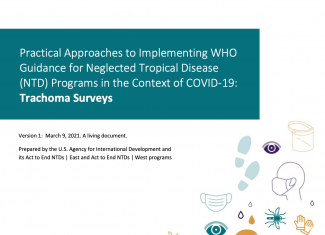Trachoma baseline surveys, trachoma impact surveys, trachoma surveillance surveys, and trichiasis-only surveys are key disease-specific assessments of trachoma elimination programs, used to start mass drug administration (MDA), monitor progress, decide when to stop MDA, and inform attainment of elimination of trachoma as a public health problem.
During this unprecedented coronavirus disease 2019 (COVID-19) pandemic, adjustments are needed to ensure safe programming. This resource document complements World Health Organization’s (WHO’s) guidance for neglected tropical disease (NTD) programs released on July 27, 2020. It provides ideas and practical examples on operationalizing the guidance so that it can be applied to field activities. This document is designed as a resource for national NTD programs as they develop their own country-specific standard operating procedures (SOPs), training materials, and supervision checklists to decrease the opportunity for COVID-19 transmission. Moreover, it can be adapted to align with country-specific contexts and environments.
The suggestions and examples contained in this document were led by in-country staff. They are based on lessons learned from experience with Ministry of Health-led NTD programs supported by USAID’s Act to End NTDs | East and Act to End NTDs | West programs. They also build on materials developed by health ministries.
Learn more about the training module here.
